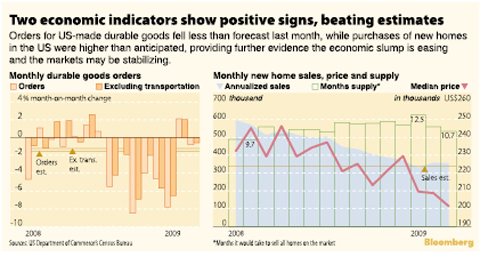The US dollar traded mainly lower on Friday as a brighter mood on global financial markets sharpened risk appetite and limited moves into safe haven currencies.
Sterling sank however on news that the British economy plunged deeper into recession in the first quarter of this year.
At 9pm GMT, the euro traded up at US$1.3242 from US$1.3144 late in New York on Thursday.

Against the Japanese currency, the dollar eased to ¥97.13 from ¥97.95 on Thursday.
The dollar has been seen as a safe haven from market turbulence, so the improved data hurt the greenback.
Durable goods orders fell 0.8 percent amid expectations for a 1.5 percent drop, but Schlossberg said a key measurement of future activity, capital spending rose for the second consecutive month, “suggesting of a possible turnaround in the not too distant future.”
New US home sales fell 0.6 percent last month from an upwardly revised level in February, another sign of a potential improvement.
In late New York trading, the US dollar stood at 1.1369 Swiss francs from SF1.1503 on Thursday.
The pound was at US$1.4663 after US$1.4721.
Asian currencies gained this week, led by Malaysia’s ringgit and the Singapore dollar, on signs record interest-rate cuts and government stimulus spending are helping revive economic growth.
The Bloomberg-JPMorgan Asia Dollar Index, which tracks the region’s 10 most-used currencies excluding the yen, rose as investors pumped more funds into emerging markets.
The New Taiwan dollar had a weekly advance, halting two weeks of losses, on speculation China’s economic stimulus measures are boosting demand for the nation’s exports.
The currency rose to the highest level in a week against the US dollar after reports this week showed export orders and manufacturing last month contracted by less than economists predicted in Bloomberg surveys.
The New Taiwan dollar rose 0.3 percent for the week to NT$33.711.
The ringgit climbed 0.9 percent to 3.5855 versus the US dollar this week in Kuala Lumpur, according to data compiled by Bloomberg. The Singapore dollar strengthened 0.8 percent for the week to S$1.4902.

When an apartment comes up for rent in Germany’s big cities, hundreds of prospective tenants often queue down the street to view it, but the acute shortage of affordable housing is getting scant attention ahead of today’s snap general election. “Housing is one of the main problems for people, but nobody talks about it, nobody takes it seriously,” said Andreas Ibel, president of Build Europe, an association representing housing developers. Migration and the sluggish economy top the list of voters’ concerns, but analysts say housing policy fails to break through as returns on investment take time to register, making the

‘SILVER LINING’: Although the news caused TSMC to fall on the local market, an analyst said that as tariffs are not set to go into effect until April, there is still time for negotiations US President Donald Trump on Tuesday said that he would likely impose tariffs on semiconductor, automobile and pharmaceutical imports of about 25 percent, with an announcement coming as soon as April 2 in a move that would represent a dramatic widening of the US leader’s trade war. “I probably will tell you that on April 2, but it’ll be in the neighborhood of 25 percent,” Trump told reporters at his Mar-a-Lago club when asked about his plan for auto tariffs. Asked about similar levies on pharmaceutical drugs and semiconductors, the president said that “it’ll be 25 percent and higher, and it’ll

NOT TO WORRY: Some people are concerned funds might continue moving out of the country, but the central bank said financial account outflows are not unusual in Taiwan Taiwan’s outbound investments hit a new high last year due to investments made by contract chipmaker Taiwan Semiconductor Manufacturing Co (TSMC, 台積電) and other major manufacturers to boost global expansion, the central bank said on Thursday. The net increase in outbound investments last year reached a record US$21.05 billion, while the net increase in outbound investments by Taiwanese residents reached a record US$31.98 billion, central bank data showed. Chen Fei-wen (陳斐紋), deputy director of the central bank’s Department of Economic Research, said the increase was largely due to TSMC’s efforts to expand production in the US and Japan. Investments by Vanguard International

WARNING SHOT: The US president has threatened to impose 25 percent tariffs on all imported vehicles, and similar or higher duties on pharmaceuticals and semiconductors US President Donald Trump on Wednesday suggested that a trade deal with China was “possible” — a key target in the US leader’s tariffs policy. The US in 2020 had already agreed to “a great trade deal with China” and a new deal was “possible,” Trump said. Trump said he expected Chinese President Xi Jinping (習近平) to visit the US, without giving a timeline for his trip. Trump also said that he was talking to China about TikTok, as the US seeks to broker a sale of the popular app owned by Chinese firm ByteDance Ltd (字節跳動). Trump last week said that he had